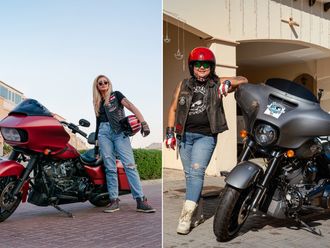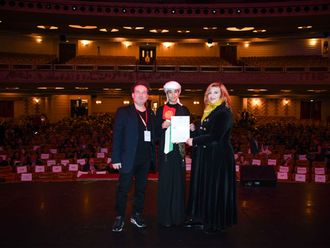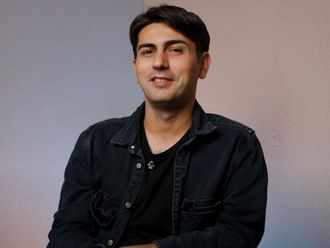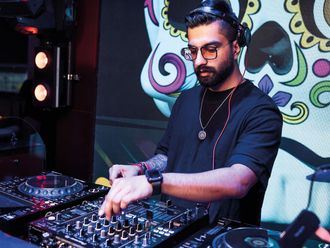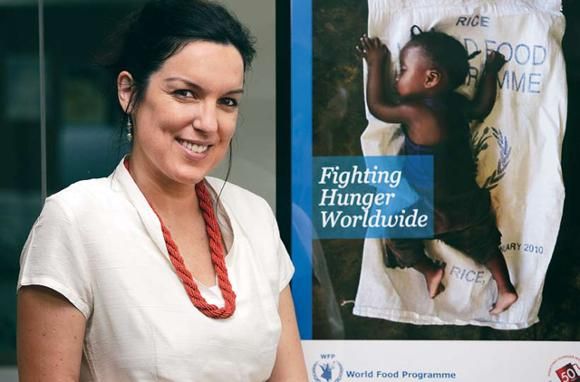
Elise Bijon’s business card must be extra large to accommodate her title. She is the Partnerships and Business Development Manager, Middle East and North Africa, Eastern Europe and Central Asia, of the United Nations’ World Food Programme.
But her business-like title doesn’t prepare you for the warm, compassionate and passionate woman she is in person. She has the shocking figures at her fingertips: “It is estimated that one billion people suffer from hunger in the world today.
Each year, under-nutrition contributes to the death of five million children in developing countries.” But she is also interested in the human side of the statistics, and strives for workable solutions. “What most people forget is that it takes so little to make a big difference,” she says in her soft, French-accented lilt.
“With 25 US cents, less than a dirham, donated to the World Food Programme (WFP), a hungry schoolchild can be fed a meal a day. Imagine, it’s that easy!” She may beguile you with her petite looks, but Elise is one tough lady. As consultant to the United Nations Development Programme she’s witnessed carnage in Conakry, Guinea, during the dictatorial government’s crackdown on citizens demanding democratic elections in 2009, “from a few hundred metres away”.
While that didn’t compel her to leave the country, what forced her to evacuate was the fact that she couldn’t “stand around and do nothing while the people were undergoing such pain”. Elise, 33, rarely gives up. The one time the mother of two-year-old twins remembers doing so was when she quit piano lessons after nine years of practice. The reason? “One day I suddenly realised it was not my instrument.
There was no way I’d be great at it.” She’s still searching for that elusive musical instrument. “It’ll come to me one day,” she smiles. “Then I’ll be ready for it.” As ready as she is on any given day to give 100 per cent to her objective of helping people in need across the world. Whether that’s through the UN or independent of it.
Work
I am a fearless person. I don’t know if it’s a strength or a weakness, but I am not scared. It doesn’t have to do with the job. I am not afraid of facing up to my weaknesses or faults either. I spent two years as technical consultant of the UNDP’s (United Nations Development Programme) Political and Strategic Unit in Conakry, Guinea, in East Africa. It was during the internal turmoil that was going on between 2009 and 2010.
During my two years in Conakry I witnessed two coup d’états; one failed and one succeeded. I was evacuated from there twice during political emergencies, and was witness to the 2009 massacre where more than 300 people were slaughtered with bayonets a few hundred metres away from me.
It could have fazed anybody, but I stuck through because it was the life I chose – I wanted to understand and experience the people’s hardships. It has had a profound effect on me. Seeing the way the Guineans dealt with it – with forgiveness instead of hate – taught me a lot, and I learnt to deal with the carnage I witnessed.
I also helped with the first free democratic elections in Guinea. As the UNDP was involved in facilitating the electoral process, I liaised between the local government and communities. The most difficult part was not the lack of comfort or security, but the impossibility of projecting yourself in time, not knowing if I would still be in the country, in that apartment, in that job the next week. That, for a western mind, is so unsettling.
We need that projection, the sense of sureness. We do not have the ‘wisdom’ that you find in Africa and some parts of Asia to live in the present day and not think of tomorrow. I don’t have that and that’s what made life in Conakry so difficult to handle. I need to have a concrete vision, a dream that I can work towards, secure in the knowledge that it will not change into something else altogether tomorrow.
I now know the reason why people develop that sense of fatality is because of the political and personal insecurity. That is the only way to cope with the situation. The most difficult part of being in the middle of the violence and insecurity was not being able to do anything about it. It was an internal issue. Like most other African countries, Guineans are very proud people.
They were the first to demand independence from French colonial rule. They paid a very high price for that, but they are very proud of having done it. So, they don’t blame the internal problems on the French who were in power until they gained independence. My husband, Nabil Abou Hamzeh, who’s Lebanese and works for a private firm, and I were not personally in danger, but violence was escalating.
More than fear, it was the frustration and anger of not being able to do anything about it that finally made us leave. For me that was more acceptable than staying on and doing nothing. My relationship with the citizens of Guinea has changed. They are very soft, cheerful and genuinely warm people. That’s why the violence that exploded there was so shocking. All the more so because, until then, Guinea was such a peaceful country.
It was safe to go out in the nights in Conakry, even though street lights are scarce and it’s mostly dark. But we have to understand they have their own way of processing it. It’s very difficult to take when your own countrymen slaughter you because of different ideologies. But like in some countries in west Africa, Guineans have some rituals around national forgiveness.
The ones who have committed the crimes confess and beg for forgiveness, promising to undo what they’ve done to the extent possible. The victims may choose to accept it, and it can be a closure of sorts. It’s beautiful. They can process a lot of horrible things through those rituals where they embrace the mistakes and officially ask for forgiveness, and the people in turn forgive them. It’s very powerful.
Guinea, which is essentially an Islamic nation, has a sizeable population of Christians and both live together harmoniously. During the national forgiveness rituals the mosques and churches worked together to facilitate the process. It was amazing. But there was not enough media coverage of the process, though the international media had covered the coup d’états and the massacres.
The country had taken a U-turn within eight months of the second coup. I would like to see the success stories of Africa get as much prominence. It will give them the courage to go ahead against the challenges they are facing. I suppose I can trace most of the patterns of my life to my childhood. I am French, the eldest of a family of four sisters. I was born in Paris, but my globe trotting parents took us to the other end of the world. We had a kind of nomadic life, which influenced me very much.
We moved to Vanuatu, a small island in the South Pacific, when I was two. It is a beautiful place. Very warm people, fantastic beaches, beautiful nature, and a very simple life. But other than that there is nothing there. You didn’t need much to get by. You spent the day on the beach, food was grown on the island, so it was cheap. Life was easy.
My father was a very colourful personality, and led many lives. He’s an adventurer at heart, worked across the world first in the private sector and then in the development sector. Now he’s an economic advisor to the French embassies. In a way, he’s influenced me in my professional life too.
When I was six we moved to New Caledonia, a larger island nearby, a French territory where we stayed for three years. He started a newspaper there. After this we returned to Paris. This time our stay extended to almost seven years. We then returned to Vanuatu with my father being posted there as advisor to the prime minister. I went to the French school in Port-Vila, the capital of Vanuatu. I later moved to Beirut, where my father was posted.
Academically it was probably the best choice I made. The level of education there is amazing, and I chose to study philosophy at the Université Saint-Joseph. It worked to my advantage because philosophy is not the most popular of subjects, so there were just three students in my class. It was like having private lessons with the best possible scholars in the mystical and intellectual city of Beirut!
For my Masters I chose the Université Paris Sorbonne in France, and I was extremely disappointed. After the intellectual rigour I experienced in Beirut, to find myself in a huge arena with no connection to my teachers in Paris, I was bored! Then reality began to sink in; it’s difficult to get a job with a masters in philosophy if you are not interested in teaching.
So, I did another masters programme in communication from Université Paris Est (Marne-la-Vallée). It opened up new possibilities for me. But after getting the degree I found I was not yet ready to enter ‘real life’ – a professional career. I even wondered if I was just a ‘searcher’, after all. That was when I decided to work on a doctorate in political philosophy, as I was interested in inter-cultural dialogue.
So I acquired a masters in the subject, but when it came to choosing a topic for the PhD I couldn’t find one that intrigued me enough. Then I took a decision that has stood me in good stead. I decided I would go back to it when I found the right topic. This taught me an important lesson: sometimes we have to go with the flow.
Another thing that perhaps shaped me was that I worked my way through college. It’s a very French thing – you have to work as a student even if you come from a privileged background. While in Beirut I worked as a waitress in a restaurant. I also edited the L’Agenda Cultural, the number-one cultural guide in Lebanon. In Paris I worked for the Shell Company in the communication and CSR department.
At the same time my romantic life was flowering too. I had met a very charming Lebanese man, Nabil, while in Beirut. He was studying in London while I was acquiring my degrees in Paris, and perhaps it was the distance between us that made me realise that he was my future husband.
So we moved to Kuwait together in 2003 after completing our studies. That’s when my father’s example stood me in good stead – to work in the private sector and acquire the expertise before moving to the public sector – the nonprofit sector I was interested in serving. To that end I joined the marketing communications company JWT.
I learnt a lot there, which helped me when I moved to the development sector. I always knew I would, and I wanted to learn how to leverage the private sector for maximum benefit. When Nabil moved to Dubai three years later, I managed to get a transfer too. We always decided our future mutually, and in consultation.
The move to Dubai was to change my life, because a few months after moving here I received an offer to work for the International Humanitarian City. It was an innovative concept, creating a humanitarian hub. The idea was to create a community spirit between all the member NGOs and UN agencies, and find support services they all could benefit from – communication support, volunteer and staff recruitment support, among other things.
Dubai is the biggest humanitarian logistical hub in the world. I feel I achieved quite a bit in the three years I was there. What I missed in that position was a connection to the field of action. Right from the beginning what drove my life was to serve humanity, to serve the needy and I didn’t want to do that after working hours.
That was what made me step out. Even while working in the advertising field, I mostly handled the CSR accounts. In fact, all the CSR projects were thrust to me because they knew I worked there only for that privilege. When my husband’s company, Sodexo, offered him the position of Operations Manager in Conakry, I encouraged him to take it up as it gave me the opportunity to get directly involved in humanitarian work.
Later UNDP offered me the post that gained me so much experience. Since 2010 I’ve been based in Dubai, working on partnerships with corporates. What’s keeping me at the UN is the idea that even I in my small way can make a difference. I need to feel useful to the world. Even if my efforts added a microscopic value to make the world a more positive place, it would be worth it.
I develop and manage partnerships with the private sector, both individual and corporate donors. It’s humanitarian in a way. The message I always try to convey is that to be a volunteer for a humanitarian cause you don’t need to go out into the field. You can be a little hero from where you are, in the country you live, with the skills you have, capitalising on your network.
There are ways to do that and we can teach you how. If you become an ambassador for the ‘Fight Hunger’ project with the World Food Programme and spread the word, engage your friends and colleagues to support the cause, through your work, or social media, and you encourage people to donate, that’s the best thing anybody can do.
People need to understand that this kind of commitment and engagement is of immense value. It is not less than the person who goes and works in the area of conflict or tragedy. It may be more exotic, but sitting here in Dubai or Abu Dhabi or whichever part of the world, they can do as good a job as them. They are also heroes.
I am passionate about a cause. I will not rest until I achieve it. My weakness, which can also be construed as a strength, is that I am very optimistic and gullible when I meet people. They may think that I am naïve, but it’s just that I believe that deep down we are all good, and will give everybody a chance.
Play
I am very enthusiastic and work extremely hard, which is not very easy on twins Jad and Lily. I do that because I know every extra hour I work on my job I can potentially help save a child, make a difference in someone’s life somewhere. That’s why I can’t help converting all my time into potential support I can mobilise for the programme. So I can’t be greedy with my time. I work very long hours.
That makes me a bad mother during the week, and I try to make up for it in the weekends. I hope my twins will forgive me and understand some day. I manage because of my incredibly supportive husband, Nabil. Motherhood totally changes your perspective on life, and it even changed the way I work.
I now relate to the beneficiaries much better, can now understand what a mother unable to feed her child is going through. I’ve seen weak mothers walking miles to the refugee camp to get food for their babies and having to choose which ones to leave on the roadside because they are unable to carry them both. I am able to relate to them now that I am a mother myself.
I can also understand why we say at the WFP that women, especially mothers, are the secret weapon in the war against hunger. If you give food to a mother you can be sure she will first feed her children and family. Motherhood also makes you a master at multi-tasking. Now my favourite way of spending time is going to the beach with my family. I have no time for sports or even exercise.
I used to love riding horses, but now it’s a distant dream. The way for me to relax is with a good book, though I hardly find time for it these days. I’d enjoy a detective story with a science fiction background. I love the arts. I used to draw and paint, but have not been able to after I had my children. I enjoy discovering other artists’ work.
Dream
When I was six or so I wanted to be Mother Teresa. When I told this to my parents I added that I had a problem. Though I wanted to be Mother Teresa I also wanted to wear leather miniskirts! That was my first ambition, and in a way it still is. I want to do good, but without renouncing the worldly life. I am no saint, nor do I want to be one.
I won’t be able to give up the simple pleasures of life. I enjoy them, I love art, I love
my comforts. It’s not very easy to combine both my ambitions, but I am doing much better today than I used to, though the dilemma still exists. Often I am tempted to give this all up and go and live among the poor unfortunate people we are trying to help. But my family holds me back. I have to look to their needs, and provide for my children. They should not have to pay the price for my freedom.
It’s not unique, most of us have the same dilemmas. I am also doing a PhD in sociology now. I’ve found a subject that interests me: the cultural differences in the relationship to money. We French hate to talk about money, so it’s quite an interesting topic! I will always be working in this field, whether for the UN or for my own NGO in Africa in future. The high I get is from the impact of my work, not from my job title.
Right now the WFP is the best place for me to work, and it serves my purpose brilliantly. I won’t compromise on my objective to serve my career. For me it’s not a career, it’s a way of life.



